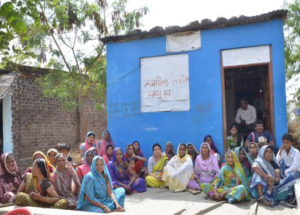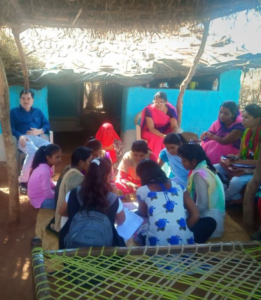1. Brief Introduction
As per the World Food Programme’s gender policy report (wfp.org/publications/wfp-gender-policy), women and girls make up 60% of the world’s chronically hungry. Little progress has been made in ensuring the equal right to food for women as enshrined in the Convention on the Elimination of All Forms of Discrimination against Women.
Gender-based inequalities is one of the biggest impediments in Indian context as it has been traditionally a patriarchal society. Achieving food and nutrition security entails enhancing and empowering women’s roles as the primary care-takers of their families.
In India the National Food Security Act (NFSA), 2013 provides for food and nutritional security of women, children and under privileged sections of the society. The act provides for the following:
a) Right to receive monthly quota of foodgrains at subsidized prices by persons belonging to eligible households under Targeted Public Distribution System (TPDS).
b) Food grains for Integrated Child Development Scheme (ICDS) for pregnant and lactating women and children under 6 years of age
c) Food grains for Mid-Day Meal (MDM) scheme which provides free meal for school children
d) Pradhan Mantri Matritva Vandana Yojana (PMMVY), a maternity benefits scheme
The foodgrains are distributed through a network of Fair Price Shops (FPS) across the country.
The act also creates an enabling environment by making eldest woman as head of the household/family, increasing transparency and efficiency of the system by leveraging Information Technology (IT), conducting periodic social audits and community participation by way of vigilance committees.
Ration Cards / Entitlement Slips – Each of the eligible families is issued a ration card or entitlement slip by the state government. This ration card or entitlement slip contains the details of head of the family, members and the amount of foodgrains that the family is entitled for.
Coverage in the State of Madhya Pradesh (MP) – In the state of Madhya Pradesh (MP), TPDS includes approx. total 11.7 million families which covers around 54.6 million individuals. There are around 24700+ FPS in the state.
GIZ – Food and Nutrition Security, Enhanced Resilience Project (FaNS)
FaNS is part of the global special initiative ‘One world – No Hunger’ by the German Ministry of Economic Cooperation and Development (BMZ). FaNS aims at enhancing food and nutrition security by facilitating the implementation of reforms envisaged under NFSA.
NFSA, 2013 empowers women by making the following provisions:
a) The eldest woman who is not less than eighteen years of age, in every eligible household, shall be head of the household for the purpose of issue of ration cards.
b) Where a household at any time does not have a woman or a woman of eighteen years of age or above, but has a female member below the age of eighteen years, then, the eldest male member of the household shall be the head of the household for the purpose of issue of ration card and the female member, on attaining the age of eighteen years, shall become the head of the household for such ration cards in place of such male member.
NFSA makes provisions for conducting periodic social audits of the planning, implementation and monitoring of NFSA provisions and service providers by the beneficiaries and civil society organization. It provides a forum to the women and under privileged sections of the society to raise their voice in case NFSA provisions are not implemented properly.
The Issues
▪ Low level of awareness among the beneficiaries, particularly women, about the entitlements and provisions of NFSA.
▪ Denial of food grains to women based on gender discrimination
▪ Denial of participation of women in monitoring of NFSA provisions
▪ Leakages in the system
2. Promoting gender equality within the program / sector
TPDS is male dominated system on all fronts which includes procurement, supply chain and distribution. FaNS through its PDS component promotes gender equality by identifying the gaps and taking simple measures to address those gaps.
Identification of major gender gaps by FaNS
a) Database analysis of TPDS beneficiaries of MP revealed that only 17% of the eligible households were having eldest woman as head of the family. Concurrent evaluation of the NFSA implementation in the state also supplemented this finding.
b) Due to lack of the capacities and trained human resources, department was not conducting social audit. As a result, women and under privileged sections of the society were not able to participate in the monitoring of NFSA provisions. This is a major gap as 4 schemes (TPDS, ICDS, MDM and PMMVY) under NFSA primarily target women and children.
Achievements of FaNS
The identified gender gaps were highlighted by FaNS in various meetings with the state government officials and actions/activities were proposed to bridge those gaps. The following concrete results were obtained by implementing the measures:
a) Database of TPDS beneficiaries was corrected and eldest woman was made head of the family (HOF) for approximately 11.1 million families (approx. 95% of eligible families). This is also reported on the NFSA national portal.
Details can be viewed by selecting the state of Madhya Pradesh on the NFSA national portal: https://nfsa.gov.in/public/nfsadashboard/PublicRCDashboard.aspx
b) A social audit model has been piloted and developed so that women can participate and raise/share their issues. The pilot was conducted in a district of MP and consisted of 36 social audit team members out of which 26 members were women.
c) A 6 members social audit team at the FPS level was formed. As part of the policy a provision has been made that out of the 6 members at least 2 members shall be the female and preference shall be given to the women belonging to Scheduled Caste/Scheduled Tribe (SC/ST) families.
d) Findings of the social audit pilot have been shared in national conference where policy makers of all the 36 States/Union Territories participated.
Some of the IEC and other material developed during social audit pilot can be accessed in DMS at: https://dms.giz.de/dms/llisapi.dll/app/nodes/281625080
Sustainability and long-term effects of the measures taken
All the measures that have been taken are at the policy and its implementation level in consultation with government partners, other stakeholders including Non-governmental organizations. This ensures their sustainability leading to long term effects, as listed below:
a) Importance of participation of the women has come in the fore-front and an enabling environment has been created.
b) Women have been empowered in true sense. The FPS dealer cannot deny foodgrains based on gender discrimination.
c) As per the policy provision for social audit, for 24700+ FPS at least 49000+ women will get trained and become members of the social audit teams.
d) However, going by the experience of the social audit pilot, approximately 70% of the social audit team members are women. This will result in 100000+ women getting trained and becoming members of social audit teams across the state of MP.
e) FaNS is actively participating in advocacy meetings with government officials and other non-governmental organizations for replicating and upscaling the social audit model.
f) The ration card is used for various other government services at the local level. Since eldest woman’s name is mentioned as head of the household/family on the ration card, women will be heard and taken seriously.
3. Gender as a quality feature of our work
FaNS program has been working keeping gender in focus.
a) While developing the social audit model, starting from design to training and finally to implementation, the focus was on women. This resulted in the following:
▪ High emphasis on mobilizing women to participate in social audit.
▪ Out of 36 social audit members, 26 were women.
▪ Gender sensitive IEC material has been developed to ensure effective participation of women.
b) An awareness campaign on the provisions of NFSA was organized with the help of a woman self-help group named as Self-Employed Women Association (SEWA). The campaign was done in 2 blocks of Chhattarpur district of MP. The campaign was done to promote food as a right, eldest woman to be head of family (HOF), entitlements of NFSA and participation of women in monitoring of NFSA.
4. Cooperation
FaNS program collaborated with the following:
▪ Department of Food and Public Distribution, Ministry of Consumer Affairs, Food and Public Distribution, Government of India
▪ Department of Food, Civil Supplies and Consumer Protection, Government of Madhya Pradesh
▪ National Informatics Centre (NIC), the IT partner of government
▪ Department of Rural Development, Government of Madhya Pradesh which is responsible for MDM
▪ Department of Women and Child Development, Government of Madhya Pradesh which is responsible for ICDS and PMMVY
▪ Civil Society organizations and subject matter specialists with line departments
▪ Eminent academic institutes of the country like Indian Institute of Management (IIM)
5. Learning
FaNS program has hammered the very basis of patriarchal society and has engineered a paradigm shift. Making eldest woman as head of the family is now a country-wide phenomenon.
Hardly any state in the country has initiated NFSA social audit covering all 4 schemes. The replication of pilot project will open the avenues for empowerment of millions of women and beneficiaries from the under privileged sections of the society. Such interventions are paving way for policy makers to progress towards a gender transformative approach in order to address food and nutrition security.
6. Competition related information
NFSA empowers women in various ways. Making women as head of family and provision of social audit are the corner stones of NFSA and is a big attempt to mainstream women in the monitoring of NFSA.
Should this application receive an award, the resources awarded shall be utilized to evolve more gender sensitive social audit methods and tools in another part of the country. FaNS strongly believes that this is a necessity in this day and age.

 GIZ Gender Website
GIZ Gender Website
